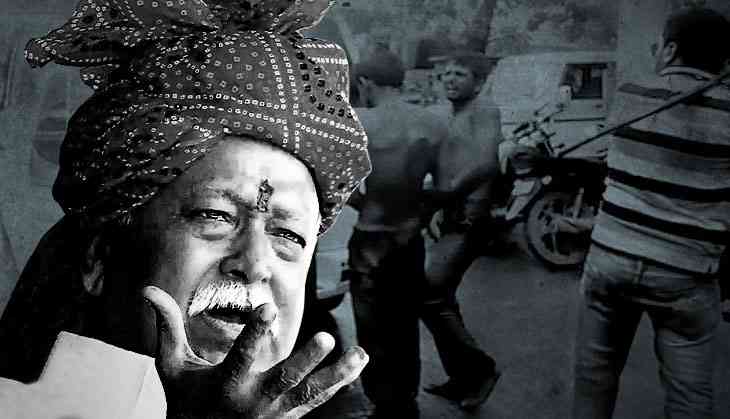Mohan Bhagwat at Bombay Stock Exchange: His take on caste proves RSS is part of the problem

It is not everyday that the chief of Rashtriya Swayamsevak Sangh (RSS) becomes an invited guest at the country's top stock exchange. However, sarsanghchalak Mohan Bhagwat squandered that novelty earlier this week by speaking on a subject on which the Sangh's regressive views are well known.
He did try to give a spin, though, in a veiled attempt to camouflage the Sangh Parivar's upper-caste politics. Politicians in India are forced to indulge in caste politics because people vote on cast lines, he said at a conference on 'Nationalism and Ethical Practices in Business' at the Bombay Stock Exchange (http://indianexpress.com/article/india/rss-chief-mohan-bhagwat-caste-in-politics-because-voting-is-on-caste-5039615/).
“Jaat-paat ki rajneeti mujhe nahi karna, aisa mein sochke bhi jata hoon lekin samaj toh jaat-paat par vote deta hai, toh mujhe karni hi padti hai,” Bhagwat said at the event. “Mujhe wahan tikna hai, tabhi toh mein parivartan laoonga (I have to stay there, which is how I will be able to bring about change)”, he elaborated.
Bhagwat's central argument, that society dictates politics and not the other way round, is not only flawed, it also serves to hide the Sangh's political approach to caste. “Jaat-paat ki raajneeti” is the Sangh's euphemism for the struggle mounted by the so-called lower castes against centuries of domination of political power by the upper castes.
It was only after the depressed classes succeeded in securing political representation, that their condition started looking up, bit by bit. If not for this fight back, the upper castes would have continued to wield unquestioned authority in the political sphere, thereby preventing formation of policies aimed at the alleviation of the exploited sections.
By saying that the society forces him to indulge in caste-based politics, Bhagwat is essentially presenting a defence of caste and caste-based discrimination. He is defending the problem because he is a part of it and he will not be able to think of a solution till he remains in that position.
The RSS and the Bharatiya Janata Party (BJP) represent the most extreme kind of upper-caste politics. RSS has always been helmed by Brahmin men and even if it has taken lower castes and women in its fold over the years, their position in the organisation has always been on the margins.
RSS and all its wings, including the BJP, are anti-reservation and have often been caught poorly trying to camouflage their opposition to it. It is only recently that the RSS launched a Dalit-outreach programme, but incidents like the Una-floggings and the Bhima-Koregaon clashes keep exposing towards which side is the Sangh Parivar inclined.
The Parivar's politics of cow-protection, in particular, is the most indicting statement of its anti-Dalit and anti-Muslim beliefs. In the four years of Modi's tenure, countless Dalits and Muslims have been thrashed, maimed and even killed in the name of cow protection.
How convenient it is to lay the blame for all this on the society's doors! Do the men behind it all – the hoodlums employed by self-styled vigilante outfits that thrive under the umbrella of the Sangh Parivar – deserve no mention?While this diabolical network is often dismissed as the fringe, it gains encouragement from mainstream leaders of the BJP and its allies. How then can the RSS argue that it is fighting from within the system to change it?The logic of
social change preceding political change is also flawed. The public elects leaders to shape policies. Elected leaders are supposed to design policies that will eventually lead the society towards equality. Having risen because of politics, how can leaders claim to be helpless before it?
The significance of the RSS chief being an invited guest at one of India's top stock exchanges should not be lost. Under Narendra Modi as Prime Minister, the only economic indicator that is incessantly going up is the stock market. How much are all sections of the population growing with it and because of it, calls for another debate.
Bhagwat should be reminded of why the country saw the establishment of a separate industrial association for Dalits, the Dalit Indian Chamber of Commerce and Industry (DICCI), over a decade ago. Deprived of good education for ages because of caste-based discrimination, Dalits have always found it hard to access jobs, let alone capital to set up their own businesses.
With the traditional industry-bodies in the country also unable to help the wannabe-entrepreneurs among Dalits, one such entrepreneur Milind Kamble, set up DICCI in 2005. DICCI's motto is to fight caste with capital. Would Kamble have been able to set it up if he were to go by Bhagwat's advice to wait for the society to change?
Edited by Joyjeet Das


